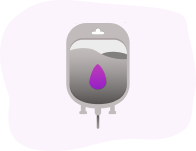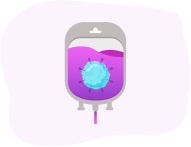There are 3 main steps to CAR T cell therapy
CAR T cell therapy is administered only at participating clinical trial sites by trained physicians. Completing all 3 steps takes several visits. At the clinical trial site, you will be cared for by an experienced team and may also see several specialists.
STEP 1: Before CAR T cell treatment
The patient’s blood is taken through a process called apheresis. The T cells are collected, and the other parts of the blood are returned to the patient’s body.

The patient’s T cells are sent to a manufacturing facility where CARs are added. They are now CAR T cells designed to find and destroy specific cells, which may include overactive and healthy cells.

Before receiving CAR T cells, the patient receives a pre-infusion treatment to help prepare their body for treatment.



